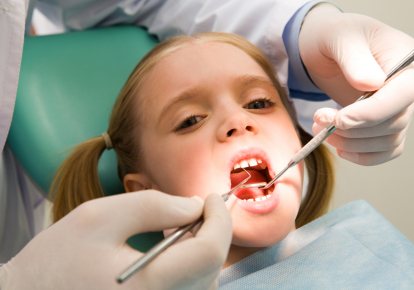
Taking Care of Your Child’s Teeth
When it comes to keep your child’s teeth clean, your pediatric dentist will be your guide. A pediatric dentist specializes in treating infants, children, and adolescents. Here are some common questions and answers from the American Academy of Pediatric Dentistry (AAPD) about the best way to care your tot’s gorgeous grin.
When should I take my child to the dentist for the first time?
Make an appointment to see the dentist as soon as your child gets his first tooth. The AAPD recommends that a child is seen by 6 months after her first tooth erupts or by 1 year old, whichever is first.
How often should the dentist see my child?
Your child should be seen every 6 months, but depending on the circumstances and your child’s oral health, your pediatric dentist may recommend more frequent visits. A dentist can help you reinforce good daily health practices (brushing, flossing, and dietary advice), in addition to detecting tooth decay in the early stages when it is easier and less costly to treat.
What is a pediatric dentist?
Pediatric dentists are the pediatricians of dentistry. They have two to three years of specialty training following dental school and limit his/her practice to treating children only. Pediatric dentists are primary and specialty oral care providers for infants and children through adolescence, including those with special health needs.
What should I use to clean my baby’s teeth?
Even before your baby’s first tooth appears, clean their gums after feedings with a damp, soft washcloth. As soon as their first tooth appears, you can start using a toothbrush. Choose a toothbrush with soft bristles and a small head. You can most likely find a toothbrush designed for infants at your local pharmacy.
How can I help my child avoid cavities?
Be sure that your child brushes his or her teeth twice a day. Flossing daily is also important, as flossing can reach spots between the teeth that brushing can’t. Avoid sugary foods and drinks, limit snacking, and maintain a healthy diet. And finally, make regular appointments so the dentist can check the health of your child’s teeth and provide professional cleanings.
What should I do if my child knocks out a permanent tooth?
Find the tooth and rinse it gently with milk. (Do not scrub or clean it with soap!) If possible, replace the tooth in the socket immediately and hold it there with clean gauze or a wash cloth. If you can’t put the tooth back in the socket, place the tooth in a clean container with cold milk, saliva, or water. Get to the pediatric dental office immediately. Don’t hesitate to call the after-hours emergency number.
What should I do if my child has a toothache?
Call your dentist to set up the first available appointment. You may apply a cold compress or ice wrapped in a cloth to the face in the area of the pain, but do not put heat or aspirin on the sore area.
My child plays sports; how can I protect his/her teeth?
Soft plastic mouth guards can be used to protect a child’s teeth from sport related injuries. If your child plays baseball, soccer, or other sports, ask your dentist about having a custom-fitted mouth guard made to protect the teeth, lips, cheeks, and gums.
Is thumb-sucking or pacifier use hurtful to my child’s teeth?
Children typically stop sucking their thumb or using a pacifier on their own before these habits can cause problems with the primary teeth. If it occurs for long periods of time, particularly if she doesn’t stop before the age of three, a pediatric dentist can evaluate for bite issues. A mouth appliance may be recommended.
You can find the answers to your other questions at:
http://www.aapd.org/resources/frequently_asked_questions/


